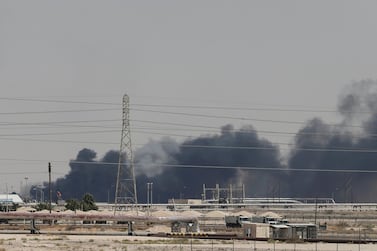Saudi oil output capacity will reach 11 million barrels per day by the end of September after attacks on Saudi Aramco facilities wiped out half of the world's largest exporter's production, the energy minister said.
About 5.7 million bpd of the kingdom’s output, the equivalent of 5 per cent of global supply, had been taken offline after the attacks on Saturday morning.
Saudi Arabia has returned 41 per cent of supply lost since the weekend with full output expected to be reached by the end of the month, Prince Abdulaziz bin Salman said in Jeddah on Tuesday.
Oil slumped after the minister's announcement, with Brent declining 5.59 per cent to trade at $65.16 per barrel at 10.15pm UAE time.
Saudi Arabia’s main oil stabilisation plant, the 7-million-bpd facility in Abqaiq, which sustained heavy damage in the attacks, is now operating at a capacity of 2 million bpd, Aramco chief executive Amin Nasser said.
“We are still in the process of doing an estimation,” he said.
Aramco’s chairman, Yasir Al Rumayyan dismissed any negative implications for the company’s planned listing because of the attacks, saying the company remained ready for an initial public offering any time over the next year.
The attacks hit at the heart of Saudi Arabia's energy centre in the Eastern Province, targeting the largest oil stabilisation plant in the world, where volatile hydrogen sulfide is processed into "sweet" crude that is safer to transport.
The plant processes an equivalent of 7 per cent of total global crude output.
The Khurais field, about 200 kilometres south-west, had a production capacity of 1.2 million bpd until the incident. The attacks also took half of the kingdom's gas production offline.
Prince Abdulaziz declared the attacks “an act of war” and said the damages sustained would not be covered by insurance.
The Abqaiq plant, which processes crude from some of the largest oilfields in the world in the Eastern Province, was processing 2 million bpd of crude, down from 4.9 million bpd before the attacks, Mr Nasser said.
The state oil company will continue to honour its export requirements and would reduce domestic refinery runs by 1 million bpd to 1.9 million bpd, Prince Abdulaziz said.
While declining to specify who is responsible for the attacks, which the US has blamed on Iran, Prince Abdulaziz said UN investigators would arrive in Saudi Arabia to determine the cause.
The attacks were the most debilitating so far on the kingdom’s energy infrastructure.







